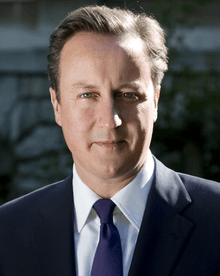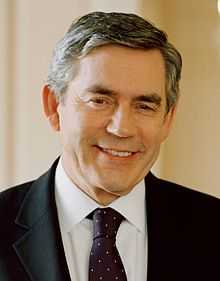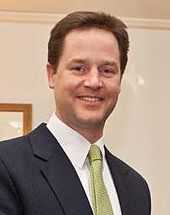Coalition (film)
| Coalition | |
|---|---|
 Promotional image. From left to right: Mark Dexter as David Cameron, Bertie Carvel as Nick Clegg and Ian Grieve as Gordon Brown | |
| Genre | Political drama |
| Written by | James Graham |
| Based on |
United Kingdom general election, 2010 2010 United Kingdom government formation |
| Starring |
Bertie Carvel Mark Dexter Ian Grieve Sebastian Armesto Mark Gatiss Donald Sumpter |
| Country | United Kingdom |
| Language | English |
| Original channel | Channel 4 |
| Release date | 28 March, 2015 |
| Running time | 95 minutes (with advertisements) |
| No. of episodes | 1 |
| Official website | |
Coalition is a television film about the formation of a coalition government following the 2010 United Kingdom general election. It was broadcast on Channel 4 on 28 March 2015, shortly before that year's general election. The film was written by James Graham and starred Bertie Carvel as Nick Clegg, Ian Grieve as Gordon Brown, and Mark Dexter as David Cameron. Graham wrote the film in the aim of giving humanity and enabling empathy to all of the figures portrayed within it, which earned it positive reviews from critics.
Plot
Nick Clegg is popular with the electorate ahead of the 2010 general election, with his Liberal Democrat party promising electoral reform and an end to the two dominant parties, Labour and Conservative. The election results in a hung parliament with no party having a majority of seats: the Conservatives have the most, then the governing Labour, and then the Liberal Democrats. Clegg is disappointed that his popularity did not reflect in the results, but is consoled by his party's former leader, Paddy Ashdown.
As the party with the most seats, the Conservatives led by David Cameron are given the first choice to form a government, which will either be a minority government or a coalition with the Liberal Democrats. Conservative peers are vehemently opposed to working with the Liberal Democrats due to what they see to be contrasting policies, while some Conservative MPs see it as a workable solution. Meanwhile Labour, led by incumbent Prime Minister Gordon Brown, prepare for negotiations with the Liberal Democrats. Brown points out to Clegg that both parties are left-wing and progressive, but Clegg is held back by the personal unpopularity of Brown amongst the British public.
Liberal Democrat MPs meet with their Conservative counterparts to negotiate a possible government, bringing up the possibility of a referendum on electoral reform. Conservative peers are furious with Cameron on this proposal, stating that reform would end any future possibility of a Conservative majority government. However, he convinces them by saying that a Labour—Liberal Democrat coalition would pass electoral reform without a referendum, as both parties support it. In another meeting, Brown tries to win over Clegg by promising to resign during their first term in government, but Clegg wants it sooner.
Brown resigns for the good of his party, making Cameron Prime Minister in a minority government. Clegg is adamant to form a coalition as he sees Labour as unpopular. His MPs are angry with the possibility of a coalition with the Conservatives, due to the opposition between the two parties. However, Ashdown makes a speech saying that this is the best opportunity for the party to enter government and execute their policies. The Conservatives and Liberal Democrats form a coalition.
Cast
| Actor | Role | Party | Notes |
|---|---|---|---|
| Mark Dexter | David Cameron | Conservative | Party leader and Leader of the Opposition who becomes the new Prime Minister |
| Sebastian Armesto | George Osborne | Conservative | Shadow Chancellor of the Exchequer who becomes the new Chancellor of the Exchequer |
| Michael Cochrane | Unnamed | Conservative | Member of parliament |
| Alex Avery | William Hague | Conservative | Former party leader and Leader of the Opposition who becomes the new Foreign Secretary |
| Andrew Bone | Andrew Coulson | Conservative | Director of communications |
| Ian Grieve | Gordon Brown | Labour | Party leader and incumbent Prime Minister before his resignation |
| Mark Gatiss | Peter Mandelson | Labour | Peer and cabinet member |
| Deborah Findlay | Harriet Harman | Labour | Deputy party leader who becomes acting leader |
| Nicholas Burns | Ed Balls | Labour | Secretary of State for Children, Schools and Families who becomes the new Shadow Secretary of State for Education |
| Bertie Carvel | Nick Clegg | Liberal Democrat | Party leader who becomes the new Deputy Prime Minister |
| Donald Sumpter | Paddy Ashdown | Liberal Democrat | Peer and former party leader[1] |
| Richard Teverson | David Laws | Liberal Democrat | Member of parliament who becomes the new Chief Secretary to the Treasury |
| Chris Larkin | Danny Alexander | Liberal Democrat | Member of parliament who becomes the new Secretary of State for Scotland |
| David Annen | Gus O'Donnell | n/a | Cabinet Secretary |
Production
The film was written by James Graham, who also scripted This House, a National Theatre play about the government of James Callaghan from 1976 to 1979.[2] Graham chose to dramatise the formation of the government in 2010 because "The personalities, clashes, the farcical nature of some of it, the loss of dignity – it was characterful and weird. The lack of sleep, the pressure, and exhaustion make it exciting ... It's really important to me to try and humanise them".[2] He stated that the message of the film was not to change political opinions, but to encourage empathy towards politicians because "There's this presumption that they're all corrupt and incompetent – but I'd love people to empathise with the incredible situation".[2]
The film was sponsored by Japanese car manufacturer Lexus.[3]
Reception
Kasia Delgado of Radio Times praised the film for managing "to make the most powerful men in the country seem both ridiculous, and entirely human", calling it "like The Thick of It on valium".[4]
In the New Statesman, Anoosh Chakelian wrote that it "starts off as satire and ends as an opera. It is the young playwright's eye for detail and evident reams of source material that allow for such an astute commentary, and human portrayal", while also being "masterfully unbiased; the one clear lesson to the audience is that our politicians are humans". He singled out the best performance to be Gatiss as Mandelson, as the "darkly frivolous" performance "has the macabre silliness spot on".[2]
Lucy Mangan of The Guardian stated that her opinion of the film was prejudiced by opinions on the politicians portrayed within it, but wrote that it gave a new image to them when "bloodless freaks began to swell with life and humanity".[5]
When commenting on the actors, GQ writer Ian McGurk praised the range of the portrayal of Brown by Grieve but reserved highest praise for Mark Dexter as Cameron, citing Dexter's striking physical similarity to the real Cameron and adding that "He also gives the best performance".[1]
See also
- Ballot Monkeys, Channel 4 sitcom broadcast during the same season
- UKIP: The First 100 Days, Channel 4 mockumentary broadcast during the same season
References
- ↑ 1.0 1.1 McGurk, Stuart (18 March 2015). "Channel 4's Coalition drama: who's who?". GQ. Retrieved 28 March 2015.
- ↑ 2.0 2.1 2.2 2.3 Chakelian, Anoosh (28 March 2015). "The Coalition will be televised: behind the scenes of Channel 4’s drama about May 2010". New Statesman. Retrieved 28 March 2015.
- ↑ "Coalition". Channel 4. Retrieved 29 March 2015.
- ↑ Delgado, Kasia (28 March 2015). "Channel 4's Coalition: "Funny, absorbing and moving, it's like the Thick of It on valium"". Radio Times. Retrieved 28 March 2015.
- ↑ "Coalition review – the bloodless freaks began to swell with life and humanity". The Guardian. 28 March 2015. Retrieved 29 March 2015.
External links
- Coalition on Channel 4
- Coalition at the Internet Movie Database
| |||||||||||||||||||||||||||||||||||||||||||||||||||||||||||||||||||||||||||||||||||||||||||||||||||||||||||||||||||||||||||||||||||||||||


